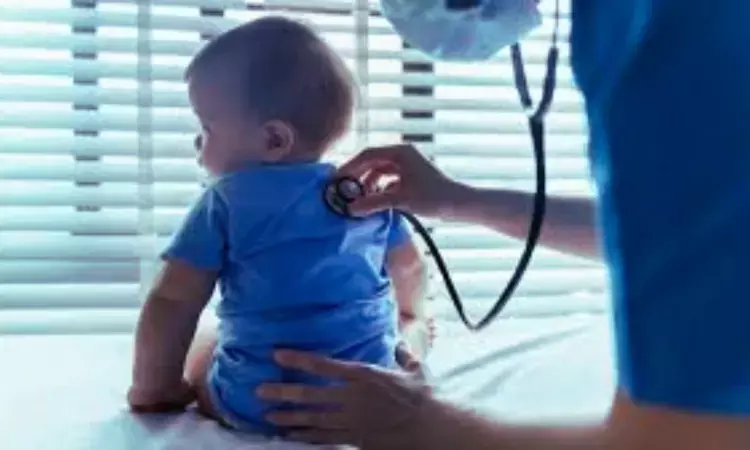- Home
- Medical news & Guidelines
- Anesthesiology
- Cardiology and CTVS
- Critical Care
- Dentistry
- Dermatology
- Diabetes and Endocrinology
- ENT
- Gastroenterology
- Medicine
- Nephrology
- Neurology
- Obstretics-Gynaecology
- Oncology
- Ophthalmology
- Orthopaedics
- Pediatrics-Neonatology
- Psychiatry
- Pulmonology
- Radiology
- Surgery
- Urology
- Laboratory Medicine
- Diet
- Nursing
- Paramedical
- Physiotherapy
- Health news
- Fact Check
- Bone Health Fact Check
- Brain Health Fact Check
- Cancer Related Fact Check
- Child Care Fact Check
- Dental and oral health fact check
- Diabetes and metabolic health fact check
- Diet and Nutrition Fact Check
- Eye and ENT Care Fact Check
- Fitness fact check
- Gut health fact check
- Heart health fact check
- Kidney health fact check
- Medical education fact check
- Men's health fact check
- Respiratory fact check
- Skin and hair care fact check
- Vaccine and Immunization fact check
- Women's health fact check
- AYUSH
- State News
- Andaman and Nicobar Islands
- Andhra Pradesh
- Arunachal Pradesh
- Assam
- Bihar
- Chandigarh
- Chattisgarh
- Dadra and Nagar Haveli
- Daman and Diu
- Delhi
- Goa
- Gujarat
- Haryana
- Himachal Pradesh
- Jammu & Kashmir
- Jharkhand
- Karnataka
- Kerala
- Ladakh
- Lakshadweep
- Madhya Pradesh
- Maharashtra
- Manipur
- Meghalaya
- Mizoram
- Nagaland
- Odisha
- Puducherry
- Punjab
- Rajasthan
- Sikkim
- Tamil Nadu
- Telangana
- Tripura
- Uttar Pradesh
- Uttrakhand
- West Bengal
- Medical Education
- Industry
Nirsevimab Protects Young Children from RSV for Up to One Year: Study

A new study published in The Journal of Infection found that the long-acting monoclonal antibody nirsevimab (Beyfortus) provides protection against respiratory syncytial virus (RSV) infection in children under 2 years of age for up to one year, but its effectiveness may not extend beyond that period.
Lower respiratory tract infections in newborns and young children are still frequently caused by the respiratory syncytial virus, which frequently results in hospitalization and long-term respiratory problems. Conventional preventative interventions, such palivizumab, are restricted to high-risk newborns and need regular administration.
A single intramuscular dosage of nirsevimab, a long-acting monoclonal antibody that targets the RSV fusion protein, offers prolonged protection, marking a breakthrough in passive vaccination. Clinical research have shown that among healthy late-preterm and term newborns, RSV-related hospitalizations and medically attended lower respiratory infections have significantly decreased. Beyond its initial effectiveness, nirsevimab's long-term consequences on immunity, viral epidemiology, and respiratory health have drawn increasing attention.
Nirsevimab will be positioned as a key instrument in lowering the worldwide burden of RSV in early children by assessing its longevity, safety, and possible impact on future RSV seasons. Thus, this study was to use a worldwide database to assess nirsevimab's preventative effects beyond 6 months following RSV infection.
A worldwide database (TriNetX) was used in this multi-center retrospective investigation. Children under 24 months old who needed RSV microbiological testing (PCR or antigen testing) between July 2023 and June 2025 were the participants. After propensity score matching, children who got their final nirsevimab dosage within 6 months, between 6 and 11 months, and after 12 months were compared with those who were not given any nirsevimab dose by epidemic season.
There were 210,626 children who did not get any nirsevimab and 4,627, 861, and 532 children under the age of 24 months who received it within 6 months, between 6 and 11 months, and beyond 12 months prior to RSV testing, respectively.
The odds ratios (OR) of a positive respiratory syncytial virus test result were 0.49 [95% confidence interval (CI) 0.42, 0.57] (p<0.001), 0.67 [0.48, 0.94] (p<0.020), and 1.21 [0.89, 1.65] (p=0.234) in the most recent epidemic season, respectively.
Overall, this study found that nirsevimab's preventative benefit against RSV infection lasted up to 12 months after injection, but no longer than that. Due to significant limitations, the findings of this study should be regarded with care.
Reference:
Kitano, T., Tsuzuki, S., Fukuda, H., & Yoshida, S. (2025). Long-term impact of nirsevimab on prevention of respiratory syncytial virus infection using a real-word global database. The Journal of Infection, 106652, 106652. https://doi.org/10.1016/j.jinf.2025.106652
Neuroscience Masters graduate
Jacinthlyn Sylvia, a Neuroscience Master's graduate from Chennai has worked extensively in deciphering the neurobiology of cognition and motor control in aging. She also has spread-out exposure to Neurosurgery from her Bachelor’s. She is currently involved in active Neuro-Oncology research. She is an upcoming neuroscientist with a fiery passion for writing. Her news cover at Medical Dialogues feature recent discoveries and updates from the healthcare and biomedical research fields. She can be reached at editorial@medicaldialogues.in
Dr Kamal Kant Kohli-MBBS, DTCD- a chest specialist with more than 30 years of practice and a flair for writing clinical articles, Dr Kamal Kant Kohli joined Medical Dialogues as a Chief Editor of Medical News. Besides writing articles, as an editor, he proofreads and verifies all the medical content published on Medical Dialogues including those coming from journals, studies,medical conferences,guidelines etc. Email: drkohli@medicaldialogues.in. Contact no. 011-43720751


